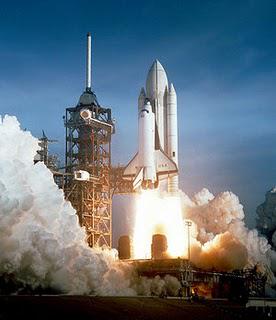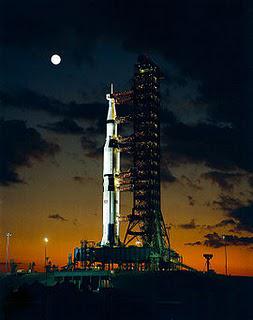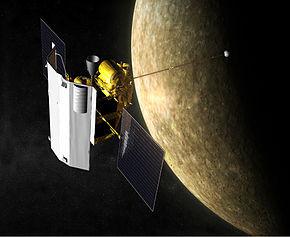by Conroy A few weeks ago I was at the Kennedy Space Center at Cape Canaveral, Florida. Only days before, the long delayed final mission of Shuttle Discovery had ended with a successful landing in Florida, but already Endeavor was on the launch pad, surrounded in its pre-launch sheath. The Endeavor launch, scheduled for April 19 (weather and mechanical integrity permitting of course), will be either the ultimate or penultimate flight of the Space Shuttle Program depending on some final Congressional budget decisions. This is the end of an era for American manned space flight.
A few weeks ago I was at the Kennedy Space Center at Cape Canaveral, Florida. Only days before, the long delayed final mission of Shuttle Discovery had ended with a successful landing in Florida, but already Endeavor was on the launch pad, surrounded in its pre-launch sheath. The Endeavor launch, scheduled for April 19 (weather and mechanical integrity permitting of course), will be either the ultimate or penultimate flight of the Space Shuttle Program depending on some final Congressional budget decisions. This is the end of an era for American manned space flight.
The Shuttle Program has been ferrying humans to an from low Earth orbit since 1981, and is ending because the shuttle fleet (or what's left of the shuttle fleet) is aging and shuttle missions are expensive. Once shuttle flights end, NASA will rely on the Russian Soyuz rockets and space craft for transport to and from the International Space Station. It is hoped that in the near future, commercial spacecraft will be available for low Earth orbit missions. We'll see what the next few years bring, but at this point in time, with the preeminent symbol of both NASA and manned space flight soon to be a piece of history, we can ask ourselves what next for NASA? On an even broader scale, what next for the story of men in space?
---
NASA and the Future
A quick review of NASA's 2011 Strategic Plan outlines six strategic goals. Many of these goals seem important, like expanding our understanding of Earth and universe (Goal 2), or at a minimum worthwhile, like advancing aeronautics research for the public benefit (Goal 4), but I want to focus on Goal 1 - "extend and sustain human activities across the solar system". And specifically, Goal 1.3, "develop an integrated architecture and capabilities for safe crewed and cargo missions beyond low Earth orbit". Or put differently, deep space flight, like missions to the Moon, Mars, asteroids, and other celestial bodies. Should this be a goal of our government?

Saturn V ready for launch
When I was at the Kennedy Space Center I visited the Apollo / Saturn V Center, where one of the three surviving Saturn V rockets was on display along with many other artifacts of the Apollo Program. What an awesome piece of machinery the Saturn V is. As big as a World War II destroyer and the only rocket ever to propel men out of low Earth orbit. It stands as an impressive testament to American ingenuity and engineering. Indeed, the entire Apollo Program, which took men to the Moon, is a powerful demonstration of the political, organizational, and technical focus needed to accomplish an unbelievably ambitious goal. It is also a stunning example of how great accomplishments often rely on massive resources. From 1962 through the end of the decade, NASA absorbed over $32 billion dollars (or over $190 billion in 2007 dollars) in funding, or nearly 3% of the entire federal budget during that time. The Cold War era Space Race was the backdrop that made such profligate spending possible.
Is there any reason to believe that a new program, designed to take mankind back to the Moon, or to Mars, or some other destination in the solar system, would be any less expensive (in percentage terms)? Indeed, a skeptic of government financial responsibility (like this blogger) could expect the program to be even more expensive. In this age of austerity, when governments everywhere are facing massive deficits and considering any means to constrain spending, where will the money for a new deep space program be found? Perhaps a more important question, how can massive expenditures for such a project be justified?
The Purpose of Space Travel
If we're going to answer that question I think we need to ask what would be the purpose of sending men and women out of low Earth orbit? To continue mankind's exploration of our world and by extension our solar system and beyond? Well I think it is essential to remember that the Age of Exploration, a historical era that future space explorations are often compared to, was driven more by political and commercial interests and not an overarching desire to expand man's knowledge. Similarly, as noted above, the entire Apollo Program, and the Space Race was driven by Cold War political interests and not scientific endeavors. Should we expect future space exploration to be something different? Exploration for exploration's sake? I'd answer, no.

Depiction of the MESSENGER probe near Mercury
NASA and other space agencies have already sent many probes to various places in our solar system. Right now the MESSENGER probe is orbiting Mercury, sending back detailed information about the innermost planet for the first time. The Opportunity rover is currently carrying out exploration along the surface of Mars. Aren't these probes, and similar future missions, our best bet to explore the solar system and provide the scientific data that are part of NASA's strategic objectives? I'd answer, yes.
Perhaps manned space exploration could gather some momentum if there was some money to be made. Few things motivate people more than the chance for profit, but it's hard to see any practical reason to search for resources (are there any other commercial opportunities?) away from this planet when so many resources lay unexploited in the ground we tread on everyday.
Time and Space

Will humans ever gaze Mars from this close?
Then there is the practical argument. Mars, the closest planet that we can actually visit (Venus is closer but is far too inhospitable for man) at it's closest approach to Earth would take eight or nine months to reach using current technology. And that's just the trip to Mars. This is a long time for humans to travel in space. Think of the food, water, and other resources that would be needed to maintain a crew in space for that long. How practical is a round trip journey that would take at a minimum two years to complete? We have yet to develop rockets capable to taking humans and their needed payload on a journey of this length. And that's not even considering the material that might be needed to make some sort of scientific station or base on Mars itself.
Current NASA policy is to land a man on Mars, though the actual time line is sketchy. The quoted dates are sometime around 2030, but without a definite plan, and more importantly, clear funding and political initiative, no mission will develop. This is just as well, what more can we learn, really, from landing humans on Mars then we can learn by ever more advanced probes, satellites, and instrumentation? I'd answer, little.
And Mars is one of the closest targets. Things would only get more difficult when it comes to asteroids or the moons of Jupiter or Saturn. Science fiction is replete with voyages to distance places. It seems that science fiction is the only place where these voyages will be realized.
Earth Bound
And finally, we have to ask the ultimate question - why do humans need to leave Earth? Earth is our home. The place where we are specifically evolved to survive. We should certainly use space technology to understand more about our planet, and about the objects and forces in our solar system that affect the conditions on Earth. Low Earth orbit missions, suborbital space flight, the use of satellites, telescopes, space probes, and other scientific and commercial space enterprises are worthy uses of our investments and resources. As humans we have a responsibility to care for this planet, as far a humans are capable of doing anyway, and utilize our technology, including space technology, toward this end.

Earth seen from low Earth orbit
But are humans ever really going to live somewhere other than Earth? Are we going to "terraform" Mars and other celestial bodies? Will this ever be needed? I'd answer no, at least not for economic and demographic reasons.
Will humans be driven to space exploration, like we have been driven to climb high mountains, sail across massive oceans, and yes, go to the Moon, because of a human impulse to strike out into the unknown? Perhaps, but like those earlier Earth bound adventures, these voyages will have to be the quests of brave individuals and not the missions of nations. I support missions of wonder, but not at the public's expense.
We can proudly look back to the Apollo missions and those remarkable days of July 1969 when man walked on the Moon in front of a captivated world. I do this frequently (though no one has walked on the moon during my life), but I doubt we will look up at men walking on Mars or some other world in my lifetime (and I hope to live a long time yet). This prediction doesn't disappoint me, I'm confident that man's knowledge will expand greatly without anyone leaving the orbit of our Earth.

